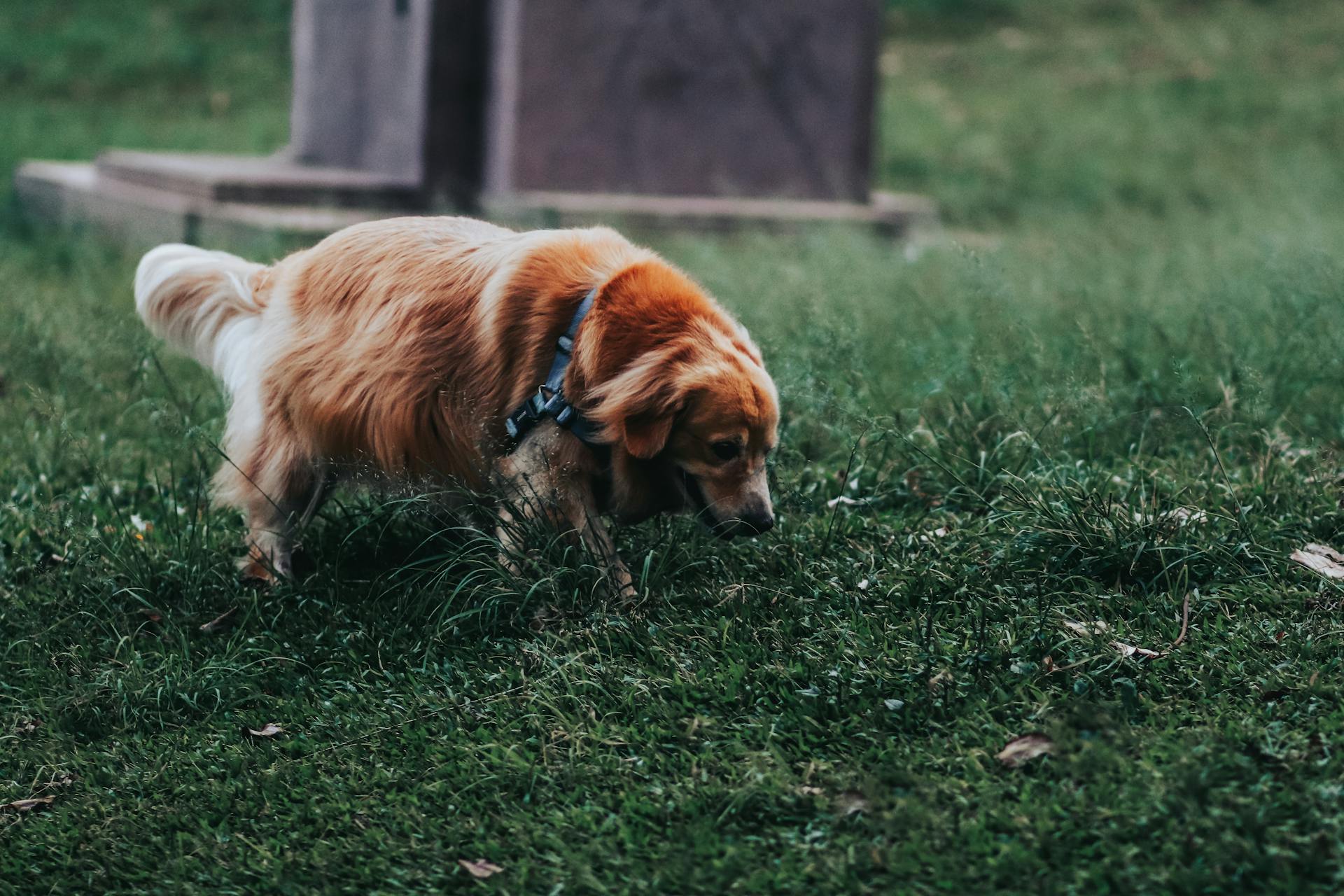
Morkie behavior problems can be challenging to address, but understanding their causes is the first step towards finding solutions.
Morkies are prone to barking due to their high energy levels and strong instinct to alert their owners to potential threats.
One common cause of barking in Morkies is separation anxiety, which can be triggered by their tendency to form strong bonds with their owners.
Morkies are intelligent dogs and can easily become bored if they don't receive enough mental and physical stimulation.
Their small size doesn't mean they don't need regular exercise to stay happy and healthy.
Housebreaking issues in Morkies can be caused by inconsistent training and a lack of clear boundaries.
Morkies are highly social dogs and require regular interaction with their owners and other animals to prevent behavioral problems.
Morkie Temperament
Morkies are intelligent dogs, making them great students if you're willing to train them. They're also very smart, which means they can be trained with patience and consistency.
Morkies can be needy, suffering from separation anxiety, and may become destructive if they don't receive enough attention and exercise. They require regular walks and play sessions to keep them happy and healthy.
Morkies are known to inherit sassiness and a bold, adventurous streak from their Yorkie parent, but this is beautifully balanced by the loving and calm traits from their Maltese parent. This unique combination makes them a great choice for families with children or people living independently.
Morkies can be very yappy with barking, often stemming from anxiety or aggression, but socialization is key to handling these negative behaviors. By understanding why your Morkie is behaving a certain way, you can adapt to their needs and help them overcome their issues.
Morkies are friendly with most people, but may be hesitant around other animals. They love to cuddle and be affectionate, but may not always want to stay in your lap for too long.
Barking and Behavior
Morkies are known to be barkers, and with their Yorkie heritage, they'll likely bark when someone comes near. This makes them surprisingly good guard dogs, despite their small size.
Their tendency to bark can be a problem, but with training, they can learn to stop barking on command. Morkiepoos, being a mix of Yorkie and Maltese, inherit their parents' vocal nature, barking when they get excited or see something unfamiliar.
If your Morkie has a barking problem, it's worth reaching out to a professional dog trainer for help.
You might enjoy: Yorkie Poo vs Morkie
Do Morkies Bark?
Morkies will bark due to their Yorkshire Terrier heritage, which makes them natural barkers.
They tend to bark when someone comes near, but with training, they can learn to stop barking on command.
Morkies can be good guard dogs despite their small size, thanks to their barking habit.
However, relying on them for protection might not be the best idea.
Their barking can be a great way to express themselves when they're excited or see something unfamiliar.
Morkiepoos, being a mix of Yorkie and Maltese, often inherit this barking tendency from their parent breeds.
If your Morkie has a problem with barking, it's best to reach out to a professional dog trainer for help.
You might enjoy: When Does a Morkie Stop Growing
Small Dog Syndrome in Dogs
Small dog syndrome is a learned behavior that can affect even the most well-intentioned dog owners. It's not a natural behavior, but rather one that's brought about by the way we treat our toy dogs.
Small dog syndrome is often confused with Canine Anxiety Disorder, but it's a distinct issue. It's characterized by yapping, untrained behavior, and snappiness in tiny dogs.
The problem arises when we treat our toy dogs like babies, carrying them everywhere and overlooking bad behavior. This can lead to a range of issues, including incessant barking and yapping.
To combat small dog syndrome, it's essential to understand your role in perpetuating the behavior. If your toy dog is a pain in the neck, it's likely due to small dog syndrome, and the problem originates with you.
Here are some key signs of small dog syndrome:
- It's not a high-spirited, outgoing dog.
- It's not a happy, sociable dog.
- It's not a high-personality dog.
By recognizing these signs, you can start taking steps to combat the problem. This includes stopping the practice of carrying your dog everywhere, not letting them jump up on you, and ignoring bad behavior.
By making these changes, you can help your dog become a happier, healthier, and more centered companion.
Training and Exercise
Training and Exercise is crucial for any dog, and Morkies are no exception. They require patience, consistency, and positive reinforcement to learn good behaviors.
To train a Morkie, you'll need to be diligent and patient, as they can be stubborn at times. Consistency and repetition are key, and rewarding good behavior with treats and praise is essential.
Morkies have plenty of energy but can expend it with normal play or short walks. They're not built for long-distance running, so keep an eye out for when they become tired. Regular exercise is necessary to prevent boredom and destructive behavior.
Positive reinforcement is the way to go when training a Morkie, as scolding them can lead to negative reactions. Socialization from a young age is also vital to prevent aggression towards other dogs or cats.
Readers also liked: Behaviorist Dog Training
Intelligence
Morkies are highly intelligent dogs, inheriting their high-end pure breed parents' intelligence.
This makes them very easy to train, as they quickly pick up on new information.
Consistency is key when teaching your Morkie new things, and so is patience.
You don't want to respond to your Morkie's behavior with impatience or anxiety, as this will only make their moods worsen.
Morkies respond very well to reward training, where they get a reward when they behave or function in certain ways.
Their intelligence can sometimes lead to boredom, which can manifest as barking, chewing, and burrowing into furniture.
Exercise & Training
Training a Morkie requires diligence, patience, and plenty of positive reinforcement. Consistency and repetition are key to ensuring proper training.
Morkies have plenty of energy, but they can expend most of it with normal play with their owner or short walks. Their regular exercise requirements are relative to their size.
Training a Morkie can be tricky due to their intelligent but stubborn nature. They respond well to positive reinforcement, such as treats and a positive tone.
House training should be done through rewarding good behavior, rather than scolding them for bad behavior. Scolding can lead to a negative reaction.
Take a look at this: Dog Problem Training

Socialization from a young age is essential to prevent aggression towards other dogs or cats. Early socialization sets the foundation for a well-behaved adult dog.
Morkies have a short attention span and can get bored easily, leading to destructive behavior. Keeping them mentally stimulated through interactive games and puzzle toys can alleviate boredom and anxiety.
Exercise for Morkies should be moderate, with about 30 minutes of activity twice a day. This can include daily walkies and playtime, but avoid overexerting their small legs.
Training a Morkie Poo should be a breeze due to their intelligence and eagerness to please their humans. However, some may be slightly stubborn, requiring firm and consistent training.
Socialization and Anxiety
Morkie anxiety and aggression are often linked to separation anxiety, so it's essential to spend quality time with your Morkie.
Morkies are prone to aggression when they're afraid, and this is a natural response. However, if your Morkie is aggressive daily, it's crucial to find the source of their problem and address it.
Socializing your Morkie can help alleviate anxiety and aggression. Early socialization is key, as it helps your Morkie become acclimated to a happier and more social home.
By exposing your Morkie to new people, places, and things, you can help them become accustomed to being in the world. This can be as simple as taking them to the dog park or having new people visit your home.
Causes of Small Dog Syndrome
Small dog syndrome is a learned behavior that's not natural to small breeds. It's a result of how we owners treat our toy dogs.
The main cause of small dog syndrome is our tendency to coddle and treat our small dogs like babies. This is a biological response that's hard to overcome, but it's essential to recognize the problem.
According to the article, small dog syndrome is not a high-spirited, outgoing dog, a happy, sociable dog, or a high-personality dog. It's a behavior that's brought about by our actions as owners.
Here are some key signs that your Morkie might be suffering from small dog syndrome:
- Excessive barking and yapping
- Snapping and being untrained
- Being carried around everywhere
- Jumping up on you
- Sitting on you to "claim" you
- Hysterical behavior
By recognizing these signs and taking steps to correct our behavior as owners, we can help our Morkies become happier, healthier, and more centered dogs.
Socializing Your Morkie
Socializing your Morkie is key to reducing anxiety and aggression. Socialization can help your Morkie feel more at ease in their surroundings.
A socialized Morkie will be less anxious and aggressive than one who is feeling like a fish out of water in their surroundings. This is because socialization helps your Morkie become accustomed to new people, places, and things.
You want your Morkie to be socialized as soon as possible in life. This time in their life will be significant in shaping their surroundings.
If you get a Morkie as a young puppy, they will become acclimated to a happier and more social home. They will experience fewer fears which will also decrease their anxiety and aggression.
Socialization for any age of Morkie involves exposing them to a wide range of people, places, and things. You want them to become accustomed to being in the world.
New places are an important part of showing your Morkie that life is different everywhere. A great place to take your Morkie to is the dog park.
Make sure that your Morkie is exposed to new people frequently. Don't lock your dog up in a cage whenever the doorbell rings, as this can teach your dog to be afraid every time the doorbell rings.
Morkies get along well with other dogs, especially other small dogs. However, introducing a new Morkie to your existing pack requires caution, especially if you have big, playful pups.
Frequently Asked Questions
Do Morkies get attached to one person?
Yes, Morkies tend to form strong bonds with one person, which can sometimes lead to separation anxiety. This attachment is a common trait in Morkies and is something to consider when bringing one home.
Featured Images: pexels.com


